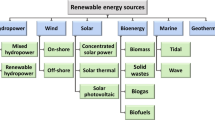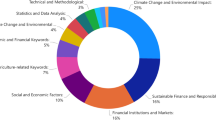Abstract
Environmental concerns are increasingly assuming prominence across the globe. Undesirable output such as carbon dioxide is the end-product of desirable productivity in energy and environmental measurement. Therefore, the current study uses data envelopment analysis to measure the energy and environmental efficiency of developed and developing countries from 2001 to 2020. In order to incentivize environmentally benign generation, undesirable outputs ought to be coupled in the evaluation of the performance of countries. One of the widely acclaimed approaches for evaluating efficiency is the Data Envelopment Analysis (DEA). Within this analysis, the traditional modeling in data envelopment analysis is expanded to incorporate a novel framework for efficiency evaluation amongst undesirable outputs. The novel efficiency estimate is extra robust, plus gives more extraordinary differentiating ability. The findings highlighted that the environmental efficiency was essentially minimal, whiles their spatial attributes increased in the East and decreased in the West, beyond more significant in the South as well as lower in the North. The findings equally show that Iceland obtained a perfect efficiency score of one for energy and environmental efficiency owing greatly to its reliance on geothermal energy which is emission-free energy. The finding is in line with the reality that the twofold data envelopment analysis model compares DMUo with the entire decision-making units in the technology, plus not only with empirical decision-making units.



Similar content being viewed by others
Data availability
The data that support the findings of this study are openly available on the mentioned sources.
References
Anderson JE, Litzow MR, Appelbaum FR, Schoch G, Fisher LD, Buckner CD, Petersen FB, Crawford SW, Press OW, Sanders JE, Bensinger WI, Martin PJ, Storb R, Sullivan KM, Hansen JA, Thomas ED (1993) Allogeneic, syngeneic, and autologous marrow transplantation for Hodgkin’s disease: the 21-year Seattle experience. J Clin Oncol 11(12):2342–2350
Charnes A, Cooper W, Lewin AY, Seiford LM (1997) Data envelopment analysis theory, methodology and applications. J Oper Res Soc. https://doi.org/10.1057/palgrave.jors.2600342
Charnes A, Cooper WW, Lewin AY, Seiford LM (1994) Basic DEA models. In Data envelopment analysis: Theory, methodology, and applications (pp 23–47). Springer, Dordrecht
Charnes A, Cooper WW, Rhodes E (1978) Measuring the efficiency of decision making units. Eur J Oper Res 2:429–444. https://doi.org/10.1016/0377-2217(78)90138-8
Chege SM, Wang D (2020) The influence of technology innovation on SME performance through environmental sustainability practices in Kenya. Technol Soc. https://doi.org/10.1016/j.techsoc.2019.101210
Chen Y, Kumara EK, Sivakumar V (2021) Invesitigation of finance industry on risk awareness model and digital economic growth. Ann Oper Res. https://doi.org/10.1007/s10479-021-04287-7
Chen Z, Wanke P, Antunes JJM, Zhang N (2017) Chinese airline efficiency under CO2 emissions and flight delays: A stochastic network DEA model. Energy Econ 68:89–108
Cheng P, Jin Q, Jiang H, Hua M, Ye Z (2020) Efficiency assessment of rural domestic sewage treatment facilities by a slacked-based DEA model. J Clean Prod 267:122111
Conlon T, McGee R (2020) Safe haven or risky hazard? Bitcoin during the Covid-19 bear market. Financ Res Lett. https://doi.org/10.1016/j.frl.2020.101607
Dotoli M, Epicoco N, Falagario M (2020) Multi-criteria decision making techniques for the management of public procurement tenders: a case study. Appl Soft Comput J. https://doi.org/10.1016/j.asoc.2020.106064
Doytch N, Uctum M (2016) Globalization and the environmental impact of sectoral FDI. Econ Syst 40(4):582–594
Emrouznejad A, Yang G-L (2018) A survey and analysis of the first 40 years of scholarly literature in DEA: 1978–2016. Socioecon Plann Sci. https://doi.org/10.1016/j.seps.2017.01.008
Gao S (2020) The hot spot of coastal container transport port finance development mode. J Coast Res. https://doi.org/10.2112/SI103-125.1
Hsu CC, Quang-Thanh N, Chien FS et al (2021) Evaluating green innovation and performance of financial development: mediating concerns of environmental regulation. Environ Sci Pollut Res. https://doi.org/10.1007/s11356-021-14499-w
Lahouel BB, Zaied YB, Song Y, Yang G (2021) Corporate social performance and financial performance relationship: a data envelopment analysis approach without explicit input. Financ Res Lett 39:101656. https://doi.org/10.1016/j.frl.2020.101656
Lei X-t, Xu Q-y, Jin C-z (2021) Nature of property right and the motives for holding cash: Empirical evidence from Chinese listed companies. Manag Decis Econ. https://doi.org/10.1002/mde.3469
Li W, Chien F, Hsu CC et al (2021) Nexus between energy poverty and energy efficiency: estimating the long-run dynamics. Resour Policy. https://doi.org/10.1016/j.resourpol.2021.102063
Liu HH, Yang GL, Liu XX, Song YY (2020) R&D performance assessment of industrial enterprises in China: a two-stage DEA approach. Socio Econ Plan Sci 71:100753
Liu JS, Lu LYY, Lu WM, Lin BJY (2013) Data envelopment analysis 1978–2010: a citation-based literature survey. Omega (United Kingdom). https://doi.org/10.1016/j.omega.2010.12.006
Mahlberg B, Obersteiner M (2012) Remeasuring the HDI by Data Envelopement Analysis. SSRN Electron J. https://doi.org/10.2139/ssrn.1999372
Maltini F (2015) 1 - The implications of climate change and energy security for global electricity supply: the Energy (R)evolution. In: Bessède J-L (ed) Eco-Friendly Innovation in Electricity Transmission and Distribution Networks. Woodhead Publishing, Oxford, pp 3–45
Matsuyama K (2019) Engel’s law in the global economy: demand-induced patterns of structural change, innovation, and trade. Econometrica. https://doi.org/10.3982/ecta13765
McCarthy J, Thatcher J (2019) Visualizing new political ecologies: a critical data studies analysis of the World Bank’s renewable energy resource mapping initiative. Geoforum 102:242–254. https://doi.org/10.1016/j.geoforum.2017.03.025
Mengarelli M, dal Magro F, Py X, Romagnoli A (2017) Environmental performance assessment of the application of high temperature phase change materials in waste-to-energy plants. Energy Procedia 143:460–465. https://doi.org/10.1016/j.egypro.2017.12.711
Mimmi SFH, Islam A (2021) A comparative study of environment risk assessment guidelines for genetically engineered plants of developing and developed countries including Bangladesh. Science Heritage Journal 5(2):21–28
Mohsin M, Hanif I, Taghizadeh-Hesary F et al (2021a) Nexus between energy efficiency and electricity reforms: a DEA-Based way forward for clean power development. Energy Policy. https://doi.org/10.1016/j.enpol.2020.112052
Mohsin M, Taghizadeh-Hesary F, Panthamit N et al (2020) Developing low carbon finance index: evidence from developed and developing economies. Financ Res Lett. https://doi.org/10.1016/j.frl.2020.101520
Mohsin M, Ullah H, Iqbal N et al (2021b) How external debt led to economic growth in South Asia: a policy perspective analysis from quantile regression. Econ Anal Policy 72:423–437. https://doi.org/10.1016/J.EAP.2021.09.012
Mohsin M, Zhou P, Iqbal N, Shah SAA (2018) Assessing oil supply security of South Asia. Energy. https://doi.org/10.1016/j.energy.2018.04.116
Ren W, Zhang Z, Wang Y, Xue B, Chen X (2020) Measuring regional eco-efficiency in China (2003–2016): A “Full World” perspective and network data envelopment analysis. Int J Environ Res Public Health 17(10):3456
Scharf M, Heide L, Grahle A et al (2020) Environmental impact of subsidy concepts for stimulating car sales in Germany. Sustain. https://doi.org/10.3390/su122310037
Schlör H, Fischer W, Hake J-F (2013) Methods of measuring sustainable development of the German energy sector. Appl Energy 101:172–181. https://doi.org/10.1016/j.apenergy.2012.05.010
Serencam H, Serencam U (2013) Toward a sustainable energy future in Turkey: an environmental perspective. Renew Sustain Energy Rev 27:325–333. https://doi.org/10.1016/j.rser.2013.06.045
Sharma G, Kapil AK (2021) Intrusion detection and prevention framework using data mining techniques for financial sector. Acta Informatica Malaysia 5(2):58–61
Smith PC, Charnes A, Cooper W et al (1997) Data envelopment analysis theory, methodology and applications. J Oper Res Soc. https://doi.org/10.2307/3010433
Song M-L, Cao S-P, Wang S-H (2019) The impact of knowledge trade on sustainable development and environment-biased technical progress. Technol Forecast Soc Change 144:512–523. https://doi.org/10.1016/j.techfore.2018.02.017
Sovacool BK (2013) An international assessment of energy security performance. Ecol Econ 88:148–158. https://doi.org/10.1016/j.ecolecon.2013.01.019
Su Y, Sun W (2018) Sustainability evaluation of the supply chain with undesired outputs and dual-role factors based on double frontier network DEA. Soft Comput 22(16):5525–5533
Sun H, Kporsu AK, Taghizadeh-Hesary F, Edziah BK (2020) Estimating environmental efficiency and convergence: 1980 to 2016. Energy 208:118224
Sun H-P, Tariq G, Haris M, Mohsin M (2019) Evaluating the environmental effects of economic openness: evidence from SAARC countries. Environ Sci Pollut Res. https://doi.org/10.1007/s11356-019-05750-6
Tan L, Dong X, Gong Z, Wang M (2018) Analysis on energy efficiency and CO2 emission reduction of an SOFC-based energy system served public buildings with large interior zones. Energy 165:1106–1118. https://doi.org/10.1016/j.energy.2018.10.054
Tang Q, Zhang M, Zhang H (2015) Efficiency evaluation of financial support on the biological medicine industry in China based on DEA: Qianqian Tang Mu Zhang. In Emerging Economies, Risk and Development, and Intelligent Technology (pp. 279–284). CRC Press
Wang Q, Yi H (2021) New energy demonstration program and China’s urban green economic growth: do regional characteristics make a difference? Energy Policy. https://doi.org/10.1016/j.enpol.2021.112161
Wang Z, Hao H, Gao F, Zhang Q, Zhang J, Zhou Y (2019) Multi-attribute decision making on reverse logistics based on DEA-TOPSIS: A study of the Shanghai End-of-life vehicles industry. J Clean Prod 214:730–737
Wu B, Liang H, Chan S (2022) Political connections, industry entry choice and performance volatility: evidence from China. Emerg Mark Financ Trade. https://doi.org/10.1080/1540496X.2021.1904878
Xu H, Wang Y, Liu H, Yang R (2020) Environmental efficiency measurement and convergence analysis of interprovincial road transport in China. Sustain. https://doi.org/10.3390/su12114613
Yasmeen H, Wang Y, Zameer H, Solangi YA (2019) Does oil price volatility influence real sector growth? Empirical evidence from Pakistan. Energy Rep. https://doi.org/10.1016/j.egyr.2019.06.006
Yasmeen H, Wang Y, Zameer H, Solangi YA (2020) Decomposing factors affecting CO2 emissions in Pakistan: insights from LMDI decomposition approach. Environ Sci Pollut Res. https://doi.org/10.1007/s11356-019-07187-3
Yu Y, Zhu W, Shi Q, Zhang Q (2016) Network-like DEA approach for environmental assessment: Evidence from US manufacturing sectors. J Clean Prod 139:277–286
Zameer H, Wang Y (2018) Energy production system optimization: Evidence from Pakistan. Renew Sust Energ Rev 82:886–893
Zameer H, Yasmeen H, Wang R et al (2020a) An empirical investigation of the coordinated development of natural resources, financial development and ecological efficiency in China. Resour Policy. https://doi.org/10.1016/j.resourpol.2020.101580
Zameer H, Yasmeen H, Zafar MW et al (2020b) Analyzing the association between innovation, economic growth, and environment: divulging the importance of FDI and trade openness in India. Environ Sci Pollut Res. https://doi.org/10.1007/s11356-020-09112-5
Zhang H, Chen Z (2020) Design of risk guarantee platform for financial support of port logistics industry. J Coast Res. https://doi.org/10.2112/SI103-154.1
Zhang Y, Li S, Zhang F (2020) Does an emissions trading policy improve environmental efficiency? Evidence from China. Sustain. https://doi.org/10.3390/su12062165
Zhu K, Li X, Campana PE et al (2018) Techno-economic feasibility of integrating energy storage systems in refrigerated warehouses. Appl Energy 216:348–357. https://doi.org/10.1016/j.apenergy.2018.01.079
Author information
Authors and Affiliations
Contributions
Jijian Zhang: Conceptualization, original draft, supervision. Robina Iram: Data curation, Writing—review & editing and software.
Corresponding author
Ethics declarations
Ethics approval and consent to participate
Not applicable.
Consent for publication
We do not have any individual person’s data in any form.
Competing interests
The authors declare no competing interests.
Additional information
Responsible Editor: Nicholas Apergis
Publisher's note
Springer Nature remains neutral with regard to jurisdictional claims in published maps and institutional affiliations.
Rights and permissions
About this article
Cite this article
Iram, R., Zhang, J. Assessing the role of financial inclusion and financial development to improve energy and environmental efficiency. Environ Sci Pollut Res 29, 49948–49965 (2022). https://doi.org/10.1007/s11356-022-18942-4
Received:
Accepted:
Published:
Issue Date:
DOI: https://doi.org/10.1007/s11356-022-18942-4




